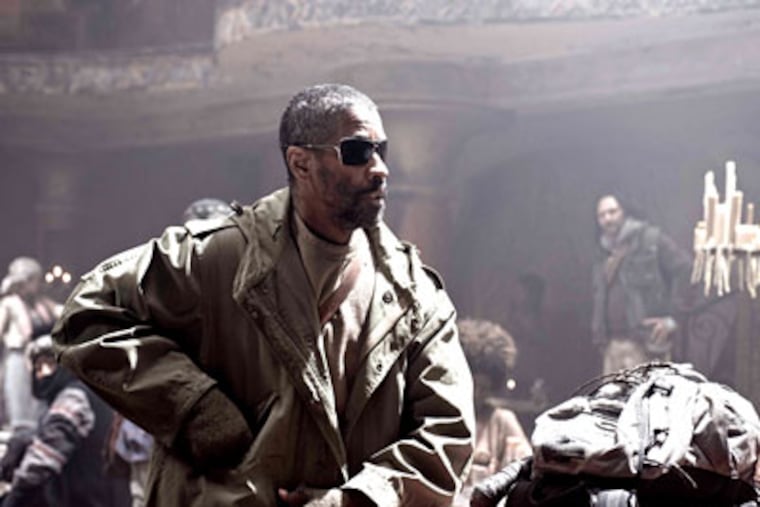Washington a mythic postapocalyptic pilgrim
Drained of color but haloed with an aura of hope, the faith-based, postapocalyptic The Book of Eli unfolds like a Clint Eastwood spaghetti western. It stars Denzel Washington as a man on a mission, a guy you mess with at your own peril.

Drained of color but haloed with an aura of hope, the faith-based, postapocalyptic The Book of Eli unfolds like a Clint Eastwood spaghetti western. It stars Denzel Washington as a man on a mission, a guy you mess with at your own peril.
In the opening scene where the grizzled Eli aims his crossbow at a feral cat and roasts it for a solitary supper, the implication is that after the apocalypse, human survival depends solely on food.
Yet the force of this haunting allegory from Albert and Allen Hughes (Menace II Society, From Hell) is its argument that spiritual sustenance may be more critical for survival than the comestible sort.
Like The Road, John Hillcoat's fine movie based on the Cormac McCarthy novel, Eli shows how the scattered survivors of the cataclysm - here the result of both holy war and solar calamity - now travel in cannibalistic tribes or are nomads scavenging the sun-scorched land. With great stealth (and sunglasses to protect him from the sun's lethal rays), Eli walks west 30 years after the apocalypse.
When attacked by human predators, Eli is unafraid to use his hunting knife or handgun on anyone who views him as a dining or supplies opportunity. His lightning-bolt knife skills would be the envy of a Tarantino hero. Is Eli a manifestation of Elijah, prophet and railer against false gods, who figures in both Old and New Testaments and the Koran?
Eli's blade-, bullet-pocked, and otherwise scarified torso is a physical inventory of the attacks he has survived while protecting the precious cargo he carries.
In Eli's backpack is a book, the title of which you can probably guess, that sustains him and keeps him on his path. Only those who lived before the apocalypse can read. Threaded through Eli's story is the importance of books in building and rebuilding civilization. And sometimes people draw inspiration from bad books.
Look no further than Carnegie (Gary Oldman), sheriff of a tumbledown bartertown where Eli gets detained. The sheriff is a reader. But given his black shirt - not to mention his intimidating office in a crumbling movie theater - it appears that Carnegie has been using the biography of Italian dictator Benito Mussolini as his gospel.
Carnegie suspects Eli has the book he wants and sends Solara (Mila Kunis, expressionless), the daughter of his mistress, Claudia (Jennifer Beals), to seduce it from the wanderer. Instead, Solara is inspired by Eli and escapes with him, leaving Carnegie and his thugs to pursue them across the parched desert.
Though not as lyrical as The Road, which benefits from both its visual artistry and its humanist perspective, The Book of Eli employs the genre conventions of the western to make mythic its principal character. Washington, ever potent, brings to the role the full force of his thousand-mile stare and regenerative smile. His pilgrim of the postapocalypse sees beyond his immediate rut and a world that's bigger than himself. In a word, Eli is inspirational.
EndText